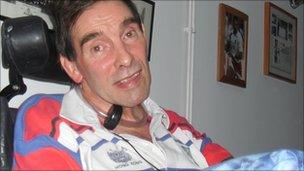Objections to right-to-die plea
- Published

Tony Nicklinson wants the court to rule on a doctor helping him to die
The court case of a severely disabled man seeking permission for a doctor to "lawfully" end his life should not go ahead, the Ministry of Justice says.
At the High Court, the ministry's lawyer said only Parliament can decide such a request - not a court.
Tony Nicklinson, 57, wants the court to declare that a doctor could intervene to end his "indignity" and have a "common law defence of necessity" against any murder charge.
The case was adjourned till 8 February.
Mr Nicklinson, from Melksham, Wiltshire, had a stroke in 2005 and was left with "locked-in syndrome".
He communicates through the use of a perspex board or by using his Eye-Blink computer and sums up his life as "dull, miserable, demeaning, undignified and intolerable".
He is seeking declarations that it is lawful for a doctor to terminate his life, with his consent and with him making the decision with full mental capacity.
At the preliminary hearing David Perry QC, representing the Ministry of Justice, asked the judge to strike out the action - which would bring it to an end.
"There are compelling reasons why the court should not intervene," he said.
Mr Nicklinson "is saying the court should positively authorise and permit as lawful the deliberate taking of his life", he said.
"That is not, and cannot be, the law of England and Wales unless Parliament were to say otherwise."
Appropriate safeguards and conditions could only be introduced by Parliament, rather than courts deciding on a case-by-case basis, he added.